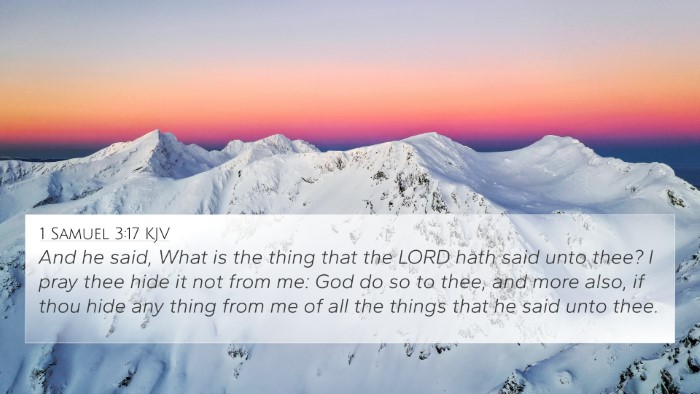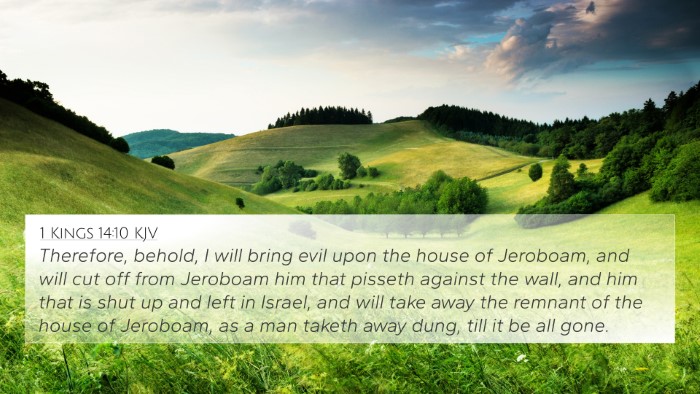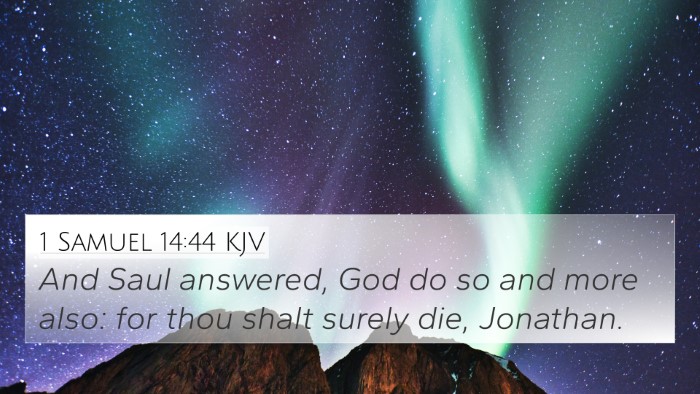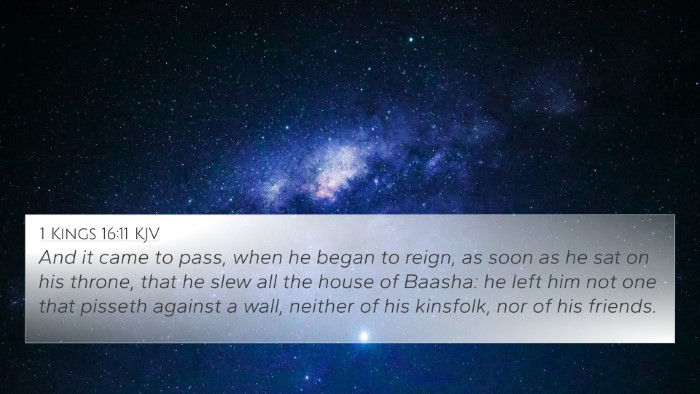Meaning and Interpretation of 1 Samuel 25:22
Bible Verse: 1 Samuel 25:22
"So and more also do God to the enemies of David, if I leave of all that pertains to him by the morning light any that pisseth against the wall."
Overview
This verse is part of a narrative involving David and Nabal. David had sent his men to Nabal asking for provisions, and when Nabal refused, David's anger flared, leading him to contemplate violence. In this context, this particular verse expresses David’s vow to wipe out Nabal’s household as an act of revenge.
Commentary Insights
- Matthew Henry:
Matthew Henry explains that David's intention to destroy all the males in Nabal's household reflects the seriousness of the insult Nabal delivered. It underscores David's sense of justice and the importance of respecting God's anointed leader.
- Albert Barnes:
Albert Barnes adds that the phrase "any that pisseth against the wall" is a euphemism for males. Barnes emphasizes that this illustrates the totality of David's judgment and determination to assert his honor. It's a harsh language that mirrors the deep offense taken by David.
- Adam Clarke:
Adam Clarke points out that David’s promise of vengeance indicates the devastation that can arise from a moment of anger and rash decisions. Clarke suggests that this moment serves as a warning against allowing oneself to be governed by wrath.
Thematic Bible Verse Connections
This verse connects with several themes found throughout the Scriptures, such as justice, vengeance, and the consequences of anger. Here are some significant Bible verse cross-references related to 1 Samuel 25:22:
- 1 Samuel 15:33: This verse also discusses the destruction of male populations due to sin against God.
- Proverbs 16:32: "He who is slow to anger is better than the mighty." This contrasts David's impulsive nature in this passage.
- James 1:19-20: These verses speak on being quick to hear and slow to anger, a principle David temporarily disregards.
- Luke 9:54-55: In the New Testament, Jesus rebukes His disciples for wanting to call down fire from heaven, showcasing how attitudes toward vengeance evolve in the narrative of faith.
- Romans 12:19: "Vengeance is mine, I will repay," highlighting God’s role in justice rather than taking it into one’s own hands.
- Exodus 22:2: Discusses the consequences of attacking a thief who unlawfully enters one's home, relating to David’s retaliatory mindset.
- Genesis 18:25: "Shall not the Judge of all the earth do right?" This emphasizes the justice of God compared to human impulses.
- Ecclesiastes 7:9: "Do not hasten in your spirit to be angry, for anger rests in the bosom of fools," a reminder for controlling one’s emotions.
- Colossians 3:8: Discusses putting away wrath and malice, encouraging believers to avoid the destructive path David considers.
- Matthew 5:38-39: Jesus’ teachings on turning the other cheek serve as a stark contrast to David’s thought process in this scenario.
Comparative Analysis and Lessons
The verse serves as a rich ground for comparative Bible verse analysis, illustrating the human condition faced with insult and injury. David's immediate resolve can be seen as a reflection of our innate desire for justice or vengeance. Insights drawn from Bible cross-reference guides reveal a spectrum of divine justice themes, urging readers to consider a higher moral ground.
Tools for Bible Cross-Referencing
Understanding contexts and connections can enhance one’s Bible study experience. Utilizing a Bible concordance or a cross-reference guide can illuminate thematic overlaps and connections like those seen in 1 Samuel 25:22.
Conclusion
The verse from 1 Samuel speaks to the broader themes of justice, human emotions, and the often unchecked impulses that can lead to destructive behaviors. By examining this verse alongside its cross-references, readers can gain deeper insights into Biblical narratives and their applications today.











